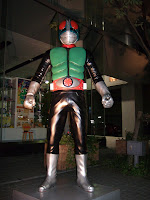
Does Asakusa Jinta + pro wrestling = an ideal Sunday evening?
I wasn't sure, but an event featuring one of Japan's best bands as well as Bronco busters and flying lariats sounded unmissable, and so I subwayed to the club Kurawood in Asakusa.

Hang out in Japan long enough and you are bound to run into mild-mannered, smart, well-adjusted Japanese adults who are also dyed-in-the-wool pro-wrestling fanatics. A couple of decades ago the sport was broadcast on prime time TV; it's no longer as big, but there's still a devoted following and the fans are of all ages, classes and social standings. Puroresu exploded into the public consciousness in the 1950's when a wrestler named Rikidozan beat American rivals and thus cheered a war-defeated population (never mind that Rikidozan was actually Korean...). The book Tokyo Underworld has a good passage describing what the puroresu mania was like for ordinary Japanese:

My father was an engineer. He was highly intelligent and liked intellectual TV shows: professional debates on NHK, lectures on science and so forth. He liked to discuss German philosophy: Goethe, Hegel, and others. He was very serious minded and looked down on things that weren't intellectual.
But he became another person when professional wresting came on, especially Japanese versus American. Something came over him. He would shoot his fist in the air, yell, jump up and down, get all excited. It was really strange. I could never understand why an intelligent person like him could watch Rikidozan so much.
To him, I guess Riki was like Robin Hood.

Half a century later puroresu no longer inflames the passions of the masses, but, as I said, it does have its followers—and about half a dozen of their most extreme representatives were there at the Kurawood on Sunday night. SWS student puroresu was their name. To lay the groundwork for the coming bloodshed they rushed out after the first act, Roman Porsche, and laid and taped together blue mats on the ground in the middle of the audience section.
 The SWS gang was the Anti-Puroresu, which was their main gag—they were skinny, petite college nerds, who would be stamped like lone ants in an actual pro ring, but even so their wrestling was hyper and quite fierce at times: a gob of spit popped out of one guy's mouth into the air after he was slammed particularly hard on the blue mats, and he staggered back into the dressing room looking disoriented after his bout ended.
The SWS gang was the Anti-Puroresu, which was their main gag—they were skinny, petite college nerds, who would be stamped like lone ants in an actual pro ring, but even so their wrestling was hyper and quite fierce at times: a gob of spit popped out of one guy's mouth into the air after he was slammed particularly hard on the blue mats, and he staggered back into the dressing room looking disoriented after his bout ended.
It wasn't clear what the girls in the audience, about the half of the crowd, thought of this spectacle: there were smiles and laughs, but a lot of them seemed to be forced, strained by the effort to show they understand and appreciate that all this male pretend-violence is all Good Fun. They wore the same expressions during the first act, Roman Porsche, a wacky duo who slammed back shots of Tabasco in between new wave karaoke numbers and shouting really obscure puroresu jokes (the singer gradually took off his clothes as the show progressed, until, Hello!, he let his prick hang out from his bikini pants at the climax, causing the girls' nervous smiles to stiffen). What do I know though, maybe many or all of them loved both the pro wrestlers and the flashing Roman Porsche duo.

On the other hand, the audience reaction to the last act, Asakusa Jinta, was unambiguous: it went crazy like some once-a-year, orgiastic, medieval sake-soaked village festival (until the very end, at the encore, when slam-dancing erupted on the floor and the frozen female smiles returned). Asianica hard marchers Asakusa Jinta may be my favorite live Japanese band these days—that they are making great, fresh rock using old Japanese jinta sounds and that a young audience is digging this is all very cool, but what matters in the end is that these folks truly swing—everyone who gets a chance should see this exhilarating bunch.

No comments:
Post a Comment